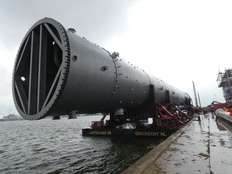
Project Milestone
A significant milestone has been reached in the construction of a world-scale propane dehydrogenation (PDH) plant in Kallo, Belgium. A 105-meter-long, 1,600-ton propylene splitter was successfully transported from the port of Antwerp to the construction site.
Key Equipment
The propylene splitter, a distillation column, is essential for separating propane from propylene produced by the new PDH plant. This equipment is one of the largest ever delivered to the Port of Antwerp in one piece.
Production Capacity
The new PDH plant will have a targeted annual production capacity of 750 kilotons, making it one of the largest and most efficient facilities globally. Production is expected to commence by the end of 2022.
Feedstock and Products
The plant will convert basic feedstock such as propane, naphtha, butane, and ethane into ethylene, propylene, and other high-value hydrocarbons. Recently, renewable propane has also been sourced to produce renewable propylene and polypropylene.
Importance of Propylene
Propylene is a crucial building block in the petrochemical industry, used to produce polypropylene and other important chemicals like propylene oxide, acrylonitrile, cumene, and acrylic acid.

